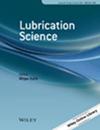Study on the High-Temperature Bearing Test and Thermal-Oxidative Process of Aviation Lubricating Oils
Abstract
With the development of aviation engine technology, the temperature in the lubricating system continues to rise. It is expected that aviation lubricating oils should have excellent thermal-oxidative stability. The high-temperature deposit and oil degradation characteristic test is adopted to evaluate the thermal stability of aviation lubricating oils in the performance specifications. In this study, a high-temperature bearing test machine was established first, and two typical aviation lubricating oils were measured by this developed test machine. The thermal-oxidative processes and ageing mechanisms of the aviation lubricating oils in the high-temperature bearing test were analysed. Moreover, the extreme-pressure and anti-wear performances of the aviation lubricating oils before and after the bearing test were studied. Experimental results indicated that the established high-temperature bearing test machine had good discriminability, and the high-temperature bearing test could meet the standard method requirements. Viscosity and total acid number (TAN) of the two aviation lubricating oils gradually increased with the high-temperature bearing test time. Antioxidants and anti-wear and extreme-pressure additives were consumed during the bearing test. Compared with dioctyldiphenylamine (DODPA), the antioxidant additive n-phenyl-α-naphthylamine (α-NPA) exhibited higher antioxidant activity under test conditions. The thermal-oxidative degradation of the aviation lubricating oils involved complex physical and chemical processes. The effects of the thermal oxidation on the extreme-pressure and anti-wear performances of the two aviation lubricating oils were significantly different.

 求助内容:
求助内容: 应助结果提醒方式:
应助结果提醒方式:


